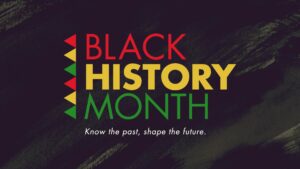In the still overhanging shadow of the COVID-19 pandemic … Black communities must look to the past to provide the light for our future, by embracing the rituals, traditions and healing modalities of our ancestors. These ways of knowing require a decolonization of thought and practice. (from the Association for the Study of African American Life and History – ASALH)
 This year’s theme for National Black History Month, “Black Health and Wellness,” takes a look at how American healthcare has often underserved the African American community. The theme acknowledges the legacy of not only Black scholars and medical practitioners in Western medicine, but also birth workers, doulas, midwives, naturopaths, herbalists, etc., throughout the African Diaspora.
This year’s theme for National Black History Month, “Black Health and Wellness,” takes a look at how American healthcare has often underserved the African American community. The theme acknowledges the legacy of not only Black scholars and medical practitioners in Western medicine, but also birth workers, doulas, midwives, naturopaths, herbalists, etc., throughout the African Diaspora.
UNC Health and the Department of Medicine celebrate the achievements of Black Americans and encourage the community to reflect on our nation’s history and the many contributions of Black Americans, to learn about the struggles Black Americans still face today.
- To honor the contributions of Black Americans, UNC Health has highlighted just a few of our many outstanding teammates here.
- On February 9 at 6:30 pm, Dr. Marcia Chatelain will deliver the 2022 African American History Month Lecture virtually, via a Zoom Webinar.
Origins of Black History Month
Dr. Carter G. Woodson, founder of the Association for the Study of African American Life and History (ASALH) first established “Negro History Week” during the second week of February. Woodson chose February for reasons of tradition and reform. It is commonly said he selected the month to encompass the birthdays of Abraham Lincoln and Frederick Douglass, men recognized as American symbols of freedom, but he also chose them for reasons of tradition.
Since Lincoln’s assassination in 1865, the black community, along with other Republicans, had been celebrating the fallen President’s birthday. And since the late 1890s, black communities across the country had been celebrating Douglass’. Well aware of the pre-existing celebrations, Woodson built Negro History Week around traditional days of commemorating the black past. He was asking the public to extend their study of black history, not to create a new tradition. In doing so, he increased his chances for success.
Yet Woodson was up to something more than building on tradition. Without saying so, he aimed to reform it from the study of two great men to a great race. Though he admired both men, Woodson had never been fond of the celebrations held in their honor. He railed against the “ignorant spellbinders” who addressed large, convivial gatherings and displayed their lack of knowledge about the men and their contributions to history. More importantly, Woodson believed that history was made by the people, not simply or primarily by great men. He envisioned the study and celebration of the Negro as a race, not simply as the producers of a great man. And Lincoln, however great, had not freed the slaves—the Union Army, including hundreds of thousands of black soldiers and sailors, had done that. Rather than focusing on two men, the black community, he believed, should focus on the countless black men and women who had contributed to the advance of human civilization.
Read more from the ASALH website.
Health and Wellness at UNC
https://thewell.unc.edu/2021/09/29/new-college-faculty-to-study-health-and-wellness-in-communities-of-color-u-s-slavery/
https://www.med.unc.edu/cher/resources-2/wellness-self-care/
https://caps.unc.edu/self-help/black-mental-health/
Other related resources:
https://www.abfe.org/wp-content/uploads/2014/04/ABFE-Black-Facts-Health-and-Wellness.pdf
https://www.blkhlth.com
https://www.blackmentalwellness.com